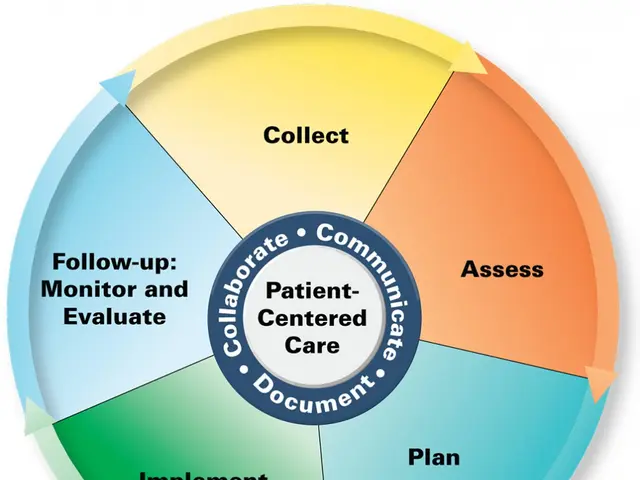Fresenius Revenue Soar Amid Tariff Uncertainty: A Battle Against Potential Trump Tariffs
Fresenius gears up, intends to dodge Trump's tariffs - Fresenius plans an expansion, aiming to dodge Trump's tariffs
Get ready for a rollercoaster ride with Fresenius, the healthcare and pharmaceutical juggernaut that's generating bigger bucks and huddling with U.S. authorities to dodge potential pharmaceutical tariffs. A stellar performance from its hospital division Helios and drug division Kabi in the opening quarter has CEO Michael Sen feeling bullish about nailing annual targets, despite the looming specter of tariffs under the Trump regime.
The U.S. government has, so far, shied away from tariffs on pharma imports but has a review kicking off. "We're chatting with the local powers-that-be," said Sen. Fresenius may argue that it contributes to the affordable, vital, and locally-produced generic medicine supply for the American healthcare system. The U.S. often grapples with issues of pharmaceutical shortages, making Fresenius's case stronger.
The U.S. represents a massive market that Fresenius remains eager to invest in. Currently, around ten percent of the company's revenue comes from Kabi's generic division, with an astounding 70 percent of medicines sold in the U.S. being produced locally by the subsidiary. Fresenius thereby stands to suffer less compared to most of its generic competitors in India and China due to import tariffs.
Strong Q1 Performance
The first quarter exceeded expectations, with revenue jumping 7% year-on-year to €5.63 billion ($6.3 billion USD), thanks to a robust cost-cutting program and core business at Kabi in areas like drugs, clinical nutrition, and medical technology. Adjusted EBIT grew 4% to €654 million ($743.4 million USD), while group net income climbed 12% to €416 million ($475.1 million USD) — excluding the stake in dialysis specialist Fresenius Medical Care.
While Fresenius aims to increase revenue by 4-6% annually, it takes potential tariff risks into account, provided they can reasonably be forecasted.
Fresenius SE* Healthcare* Pharmaceuticals* Donald Trump* USA* Michael Sen* Bad Homburg* U.S. President
Pharmaceutical Tariffs on the Table: A Trump-Aged Proposal
With the Trump administration mulling over tariffs on pharmaceutical imports under Section 232 of the Trade Expansion Act of 1962[1][2], the healthcare industry is bracing for a shift. This inquiry, launched on April 1, 2025, aims to ascertain the national security ramifications of being at the mercy of foreign pharmaceuticals, with particular concern for maintaining the drug supply chain during crises like conflicts.
By May 6, 2025, Trump sent a clear message, voicing his intention to beef up U.S. drug manufacturing. He hinted that pharmaceutical-specific tariffs might surface within two weeks, and suggested these tariffs could be phased in gradually, offering companies a breathing space to set up factories domestically[2].
Tariff Implications for Fresenius SE
Fresenius SE, a global healthcare player with deep roots in Germany, could face several hurdles should tariffs materialize:
- Heightened Costs: Tariffs would drive up the import costs for pharmaceuticals, which could affect Fresenius's pricing strategy and profitability in the U.S. market.
- Supply Chain Redesign: It might be necessary to rework the supply chain to comply with U.S. regulations, perhaps by mindshoring manufacturing plants to the U.S.
- Intensified Competition: The gradual implementation of tariffs could give Fresenius some time to adapt by investing in U.S.-based production. However, increased domestic competition could be a double-edged sword, as more companies switch to U.S. production.
- Domestic Expansion Strategy: The prospect of tariffs may prompt Fresenius into investing in U.S. manufacturing capacities to sidestep future tariff implications.
Pharmaceutical Industry - A Scenarios of Rising Costs & Boosted Infrastructure
Across the pharmaceutical sector, consequences of the proposed tariffs could blend challenges and opportunities:
- Ballooning Costs: Tariffs would inflate costs for manufacturers and consumers, leading to increased prescription prices.
- Domestic Expansion: The incentive to manufacture drugs domestically could spur investment in U.S. manufacturing infrastructure.
- Regulatory Compliance: Companies would be obliged to stick to new regulations, potentially driving up spending on research and development, and quality assurance functions.
Overall, proposed tariffs on pharmaceutical imports form part of a broader agenda aimed at ramping up domestic manufacturing and shoring up supply chain resilience. This strategy might have significant repercussions for global players like Fresenius SE.
- Fresenius SE, a global healthcare player, could face heightened costs due to potential tariffs on pharmaceutical imports under Section 232 of the Trade Expansion Act of 1962, as these tariffs may drive up the import costs for pharmaceuticals.
- The tariffs might also require Fresenius to redesign their supply chain to comply with U.S. regulations, possibly by mindshoring manufacturing plants to the U.S.
- As a result, Fresenius may experience intensified competition, as more companies switch to U.S. production, presenting a double-edged sword.
- Furthermore, the prospect of tariffs may prompt Fresenius into investing in U.S. manufacturing capacities to sidestep future tariff implications and streamline its business operations.




